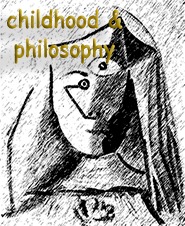o círculo de histórias como uma prática de investigação democrática e crítica
DOI:
https://doi.org/10.12957/childphilo.2021.55722Palavras-chave:
filosofia para crianças, comunidade de investigação filosófica, círculo de histórias, democracia.Resumo
Os autores deste ensaio têm sido praticantes e professores comprometidos de Filosofia para Crianças em uma variedade de ambientes educacionais, desde pré-escolas até programas de doutorado universitário e de educação religiosa e comunitária para adultos. A promoção do pensamento crítico sempre foi um objetivo primordial deste movimento. Mas as práticas comuns de pensamento crítico precisam incluir outros tipos de conversação democrática que nos induzam a ver os outros como pessoas plenamente desenvolvidas e a ter curiosidade sobre como o fato de estarmos em comunidade com elas torna o crescimento e a autocorreção possíveis. À medida que continuamos a experimentar e inovar em novos contextos, nos vemos continuando a investigação em torno da expansão da inclusão das conversas sobre as preocupações humanas básicas. Neste ensaio, descrevemos uma estratégia inclusiva chamada de círculo de histórias, que foi desenvolvida pela primeira vez como um método de educação popular na Dinamarca e depois adaptada como uma ferramenta de mudança social entre cidadãos norteamericanos pobres e sem poder nos Apalaches. Os círculos de histórias foram posteriormente utilizados em uma comunidade de aprendizagem filosófica vivencial e, mais recentemente, combinados com o método de diálogo de Lipman e Sharp da comunidade de investigação filosófica (CPI). Os autores deste artigo combinaram círculos de histórias com a comunidade de investigação filosófica em diversos contextos. Em cada iteração, contar a própria história e ouvir atentamente as histórias de outras pessoas podem ser ações igualmente reveladoras.
Downloads
Referências
Bouchard, N. (2006) Éthique et culture religieuse à l’école. Québec, QC: Presses de l’Université du Québec.
Bouchard, N. and Daniel, M.-F., eds. (2010) Penser le dialogue en éducation éthique. Québec, QC: Presses de l’Université du Québec.
Cam, P. (1994). Dewey, Lipman, and the Tradition of Reflective Education. In Taylor, Michael et al, eds. Pragmatism, Education and Children. Amsterdam: Editions Rodopi, 1994, 163-81.
Clark, S. (1990) Ready from Within: A First Person Narrative. Trenton, NJ: Africa World Press, Inc.
Englund, L. (2005) A Living Education: An Approach for the 21st Century. PhD thesis, University of Minnesota, Minneapolis [Online]. www.tc.umn.edu/~engl8813/Living_education.pdf, accessed 25 March 2016.
Ennis, R.H. (2015). Critical thinking: A streamlined conception. In M. Davies and R. Barnett (Eds.), The Palgrave handbook of critical thinking in higher education (pp. 31-47). New York, NY: Palgrave Macmillan.
Fletcher, N. (2019) Destabilizing stereotyped concepts in childhood. Prospects: Comparative Journal of Curriculum, Learning and Assessment, 182.
Gregory, M. and Laverty, M. (Eds.) (2018) In Community of Inquiry with Ann Margaret Sharp: Philosophy, Childhood and Education. London: Routledge.
Goodwin, C. and Duranti, A. (1992) Rethinking Context: Language as an Interactive Phenomenon. Cambridge, MA: Cambridge University Press.
Horton, M. (1998) The Long Haul: An Autobiography. New York: Teachers College Press.
Horton, M., Freire, P., Bell, B., Gaventa, J. and Peters, J. (1990) We Make the Road by Walking: Conversations on Education and Social Change. Philadelphia, PA: Temple University Press.
Horton, M. and Moyers, B. (1982) The Adventures of a Radical Hillbilly: An Interview with Myles Horton. Appalachian Journal 9(4): 248-285.
James, W. (1916) Talks to Teachers on Psychology. New York: Henry Holt and Company.
Lipman, M. (1985). Philosophy for children and critical thinking. National Forum 65(1): 18 23.
Lipman, M. (1988). Critical thinking: what can it be? Educational Leadership 16(1): 38-43.
Lipman, M. (1992). Unreasonable people and inappropriate judgment. Inquiry: Critical Thinking Across the Disciplines 10(3): 18-22. doi: 10.5840/inquiryctnews199210319
Lipman, M. (1997). Thinking in community. Inquiry: Critical Thinking across the Disciplines 16(4): 6-21.
Lipman, M. (2003). Thinking in education (2nd edition). Cambridge, MA: Cambridge University Press.
Marsilli-Vargas, X. (2014). Listening genres: The emergence of relevance structures through the reception of sound. Journal of Pragmatics. (69) 42-51.
Matthews, G.B. (1980). Philosophy and the Young Child. Cambridge, MA: Harvard University Press.
Matthews, G.B. (1984). Dialogues with Children. Cambridge, MA: Harvard University Press.
Matthews, G.B. (2009). ‘Philosophy and Developmental Psychology: Outgrowing the Deficit Conception of Childhood,’ in Siegel, H. (ed.), The Oxford Handbook of Philosophy of Education, pp. 163-176. Oxford University Press.
Palmer, P. (1998) The Courage to Teach: Exploring the Inner Landscape of a Teacher’s Life. San Francisco: John Wiley and Sons.
Peirce, C.S. (1997) “The Fixation of Belief.” In Pragmatism: A Reader, edited by Louis Menand. New York: Vintage.
Shea, P. (2008) Philosophy for Children and Learning Circles: How Do We Help People to Want to Be Better? Retrieved 11 July 2017 from http://gambitsanddrafts.blogspot.com/2015/02/philosophy-for-children-and-residential.html.
Thayer-Bacon, B. J. (2000). Transforming critical thinking: Thinking constructively. New York, NY: Teachers College Press.
Wallace, J. (2002) Correction: Invitation to storytelling learning circle. Workshop announcement retrieved 8 July 2017 from http://evergreen.loyola.edu/rcrews/www/sl/archives/jan02/msg00013.html.
Wallace, J. (2004) Notes on Learning Circles. In “Learning Circles: A Train-the-Trainers Approach,” pp. 10-23, retrieved 13 June 2017 from http://bonnernetwork.pbworks.com/f/BonCurFacilLearnCircles.pdf.
Wallace, J. (2007) The Problem of Time: Enabling Students to Make Long-Term Commitments to Community-Based Learning. Michigan Journal of Community Service Learning 7: 133-142 (retrieved 13 June 2017 from http://hdl.handle.net/2027/spo.3239521.0007.115).
Young, I. (1996) Communication and the Other: Beyond Deliberative Democracy. In Democracy and Difference, edited by Seyla Benhabib. Princeton: Princeton University Press.




